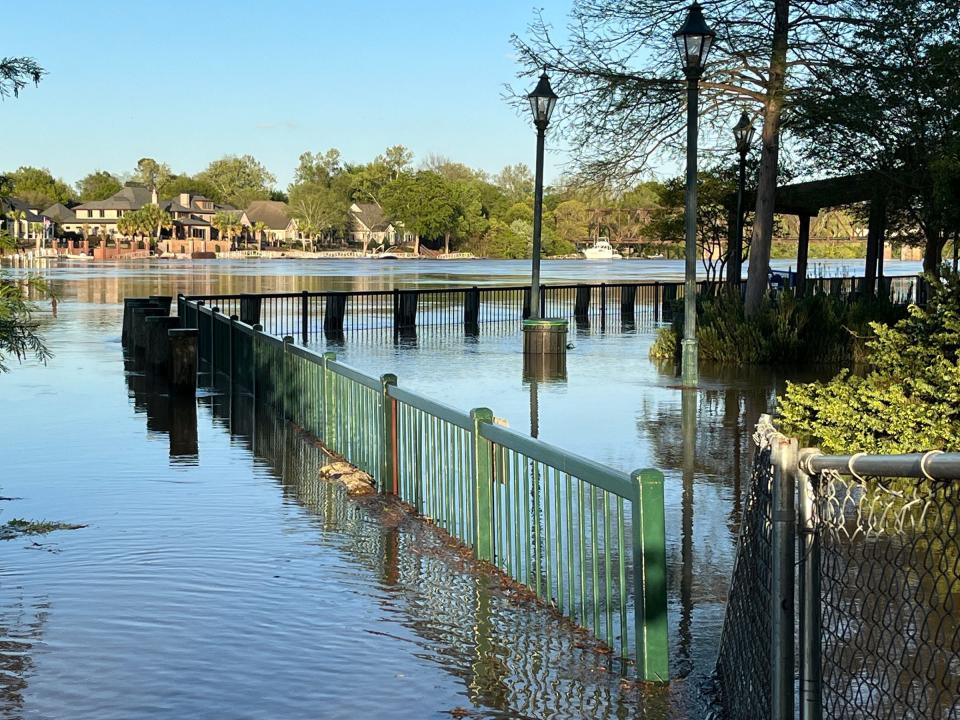Severe weather guide for Augusta: Here's what you need to know
Hurricane Ian is tracking north in the Gulf of Mexico and is expected to make landfall somewhere along the coast of Florida on Tuesday or Wednesday. The Augusta area is likely to begin to feel effects from the storm on Thursday at the earliest.
Here's what residents in Richmond and Columbia counties should know as the storm moves closer:

What to know about potential flooding in Augusta
While flooding in Augusta typically does not cause damage to buildings, drainage issues can cause water to accumulate on major roads.
Flood hazard areas are found along all waterways, including the Savannah River and urban streams, according to the Augusta Flood Mitigation Plan. The U.S. Army Corps of Engineers operates flood controls on the Savannah River, but there remains a low probability of significant flooding.
Downtown Augusta is protected by the Augusta Levee along the Savannah River from the boundary with Columbia County downstream to the New Savannah Lock and Dam.
Hurricane Ian updates: Storm may hit Georgia later this week; state making preparations
Pics from the past: Historical Photos: Augusta floods, 1912-1994
The urban streams where flooding has caused the most damage include Rae’s Creek, Cranes Creek, Rock Creek, Augusta Canal, Rocky Creek, and Oates Creek, according to the city.
In rural parts of the city, less development has encroached into floodplains. The eastern side of the city has some expansive flood-prone areas including the Phinizy Swamp and below the Savannah Lock and Dam where the Savannah River floodplain is no longer modified by the Levee.
How to track the storm
Storms are slow moving and change track often. Forecasters caution the public that predicting the path of a storm more than three days in advance is an inexact science.
"If you're not in a watch or warning area, then its best to just keep an eye on it," said local hazards expert Chuck Watson, who publishes a storm blog at blogenkiops.wordpress.com. "Even if you are, you don't have to stress out about it, but that is when you start taking action."
The National Hurricane Center issues key message updates every six hours on its website, nhc.noaa.gov. Additionally, residents can check for alerts from the Augusta Emergency Management Agency at augustaga.gov.
What to do when a storm hits
Know what to do before, during, and after severe weather.
Create a communications plan with your family before severe weather hits.
Have emergency supplies in place at home, at work, and in the car.
Listen to local officials.
Check your insurance policies to ensure you have enough coverage.
Evacuate if advised by local authorities.
When the power goes down
Local power companies such as Georgia Power Co. are preparing crews for power outages that often occur in severe weather.
Georgia Power offered these suggestions:
Before a storm
Stay aware and check the weather forecast before heading outdoors.
Check your emergency kit, unplug major appliances and charge cell phones.
During a Storm
Take safe shelter inside a sturdy building away from windows and doors.
Avoid contact with conductors of electricity – appliances, metal objects and water.
After a storm
Never touch any downed or low-hanging wire, including telephone or TV wires that touch a power line.
Never pull tree limbs off of power lines yourself or enter areas with debris or downed trees as downed power lines may be buried in wreckage.
For more information
Georgia Power has sites the public can access during and after storms.
Outage & Storm Center: Available at www.GeorgiaPower.com/Storm, customers can visit this site to sign up for Outage Alerts, report and check the status of outages. Customers can report an outage at 888-891-0938.
Outage Map: An interactive Outage Map provides near real-time information, allowing users to see where outages.
This article originally appeared on Augusta Chronicle: Augusta hurricane guide: How to prepare for flooding, severe weather

